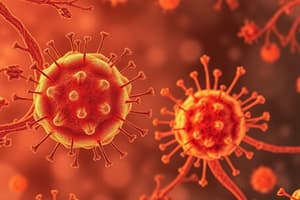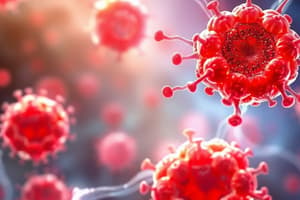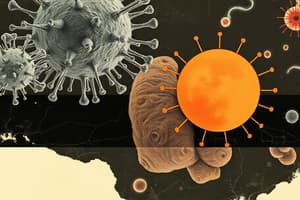Podcast
Questions and Answers
What is a major risk associated with the use of opioids for pain management?
What is a major risk associated with the use of opioids for pain management?
- Acute kidney failure
- Respiratory depression (correct)
- Increased heart rate
- Severe allergic reaction
Which of the following drugs should not be administered with grapefruit juice due to potential interactions?
Which of the following drugs should not be administered with grapefruit juice due to potential interactions?
- Naloxone
- Morphine
- Ibuprofen
- St John's Wort (correct)
Which fibers are responsible for transmitting sharp pain quickly to the brain?
Which fibers are responsible for transmitting sharp pain quickly to the brain?
- B fibers
- A fibers (correct)
- Delta fibers
- C fibers
What side effect is commonly associated with the use of morphine?
What side effect is commonly associated with the use of morphine?
Which medication is categorized as category X and is contraindicated in pregnancy?
Which medication is categorized as category X and is contraindicated in pregnancy?
What is the primary role of T cells in the immune response?
What is the primary role of T cells in the immune response?
Which of the following statements about immunomodulators is correct?
Which of the following statements about immunomodulators is correct?
What effect does propofol have in anesthesia?
What effect does propofol have in anesthesia?
What type of immunity does IgE primarily mediate?
What type of immunity does IgE primarily mediate?
Which of the following drugs can exacerbate bleeding due to its inhibition of COX enzymes?
Which of the following drugs can exacerbate bleeding due to its inhibition of COX enzymes?
What happens to nociceptors when they are stimulated?
What happens to nociceptors when they are stimulated?
Which type of vaccine involves a weakened form of the pathogen?
Which type of vaccine involves a weakened form of the pathogen?
What is a potential side effect of corticosteroid medications?
What is a potential side effect of corticosteroid medications?
What is a known effect of succinylcholine during anesthesia?
What is a known effect of succinylcholine during anesthesia?
What is the function of B cells in adaptive immunity?
What is the function of B cells in adaptive immunity?
Which of the following is NOT true regarding aspirin's action?
Which of the following is NOT true regarding aspirin's action?
Which type of vaccine can people not contract the disease from?
Which type of vaccine can people not contract the disease from?
What effect do interferons have in the immune system?
What effect do interferons have in the immune system?
How should corticosteroids be discontinued to avoid withdrawal symptoms?
How should corticosteroids be discontinued to avoid withdrawal symptoms?
Which type of immunity is provided by toxoid vaccines?
Which type of immunity is provided by toxoid vaccines?
What is the role of B cells when they encounter a new invader?
What is the role of B cells when they encounter a new invader?
Which characteristic is true about live vaccines?
Which characteristic is true about live vaccines?
What is a common side effect associated with the use of steroids?
What is a common side effect associated with the use of steroids?
How does cyclosporine primarily function as an immunomodulator?
How does cyclosporine primarily function as an immunomodulator?
What is the unique feature of recombinant vaccines?
What is the unique feature of recombinant vaccines?
Which immunoglobulin is most abundant and associated with long-term immunity from vaccines?
Which immunoglobulin is most abundant and associated with long-term immunity from vaccines?
What is the purpose of tapering off steroids slowly?
What is the purpose of tapering off steroids slowly?
Which type of vaccine can lead to passive immunity?
Which type of vaccine can lead to passive immunity?
What potential effect do interferons have on patients?
What potential effect do interferons have on patients?
In what way do T cells function in the immune response?
In what way do T cells function in the immune response?
What should be monitored in a patient taking Tylenol due to its potential impact on the liver?
What should be monitored in a patient taking Tylenol due to its potential impact on the liver?
Which of the following is NOT a known side effect of morphine?
Which of the following is NOT a known side effect of morphine?
Why should ergots be strictly avoided in pregnant patients?
Why should ergots be strictly avoided in pregnant patients?
Which type of anesthesia is characterized by complete loss of consciousness and all reflexes?
Which type of anesthesia is characterized by complete loss of consciousness and all reflexes?
What is the primary action of nitrous oxide in anesthesia?
What is the primary action of nitrous oxide in anesthesia?
What type of pain is primarily transmitted by C fibers?
What type of pain is primarily transmitted by C fibers?
What is a crucial piece of information to communicate to patients taking sumatriptan for migraines?
What is a crucial piece of information to communicate to patients taking sumatriptan for migraines?
Which of the following statements about succinylcholine is accurate?
Which of the following statements about succinylcholine is accurate?
What should be considered when prescribing ibuprofen to patients with kidney issues?
What should be considered when prescribing ibuprofen to patients with kidney issues?
What herbal supplement is known to interact negatively with several medications, particularly those affecting blood pressure?
What herbal supplement is known to interact negatively with several medications, particularly those affecting blood pressure?
What is the primary characteristic of innate immunity?
What is the primary characteristic of innate immunity?
Which immunoglobulin is specifically associated with allergic reactions?
Which immunoglobulin is specifically associated with allergic reactions?
What is a significant risk when using immunomodulators like cyclosporine?
What is a significant risk when using immunomodulators like cyclosporine?
Which of the following best describes live vaccines?
Which of the following best describes live vaccines?
What is the main consequence of quickly tapering off steroid medications?
What is the main consequence of quickly tapering off steroid medications?
What is a potential effect of long-term administration of morphine on respiratory function?
What is a potential effect of long-term administration of morphine on respiratory function?
Which medication is contraindicated in patients with a history of malignant hyperthermia?
Which medication is contraindicated in patients with a history of malignant hyperthermia?
What mechanism describes the action of triptans in treating migraines?
What mechanism describes the action of triptans in treating migraines?
In the context of pain transmission, what role does Substance P play?
In the context of pain transmission, what role does Substance P play?
What is a significant risk associated with the use of high doses of acetaminophen (Tylenol) over an extended period?
What is a significant risk associated with the use of high doses of acetaminophen (Tylenol) over an extended period?
Flashcards are hidden until you start studying
Study Notes
Immune System Overview
- Innate immunity provides immediate response to pathogens without specificity.
- Adaptive immunity relies on T and B lymphocytes to identify and target specific pathogens.
- B cells differentiate into plasma cells to produce antibodies against specific invaders.
- Cytotoxic T cells directly kill infected or abnormal cells.
Immunomodulators and Medications
- Cyclosporine is an immunosuppressant used in organ transplants to prevent rejection, affecting T cells.
- Echinacea and other immune-boosting supplements may counteract cyclosporine’s effects.
- Prednisone, anti-inflammatory steroids, can reduce immune function and must be tapered off slowly.
- Steroids may cause hyperglycemia as a side effect.
Antibody Classes
- IgG is the most abundant antibody and is associated with long-term vaccine responses.
- IgM plays a role in the initial immune response.
- IgE is primarily involved in allergic reactions.
Vaccination Types
- Live vaccines contain weakened versions of pathogens; not suitable for immunocompromised individuals.
- Examples: COVID-19 and flu vaccines.
- Toxoid vaccines provide immunity against toxins (e.g., tetanus, rabies).
- Inactivated vaccines, like the polio vaccine, cannot cause disease.
- Recombinant vaccines are created in labs and do not contain live pathogens.
Interferons
- Interferons are used for treating viral infections such as hepatitis C and HPV.
- May cause flu-like symptoms and have a black box warning for suicide risk due to serotonin depletion.
Pain Management and Analgesics
- Acetaminophen (Tylenol) can increase liver enzymes (AST, ALT), requiring caution for liver health.
- Ibuprofen inhibits COX-1/COX-2, posing risks of bleeding and is contraindicated in patients with one kidney.
- Aspirin binds to red blood cells for 7 days, increasing bleeding risk.
- Nociceptors detect tissue pain through A (sharp pain, myelinated) and C fibers (dull pain, unmyelinated).
- Opioids like morphine target mu and kappa receptors, effective for severe pain but carry risks of respiratory depression and hypotension.
- Naloxone reverses opioid overdose symptoms, particularly low respiratory and heart rates.
Migraine Treatment
- Migraines are often triggered by vasodilation; treated with triptans that induce vasoconstriction.
- Ergotamine is contraindicated in pregnancy (Category X) and must not be given if pregnancy is denied.
- Avoid grapefruit juice with certain medications due to potential interactions.
Anesthesia
- General anesthesia leads to loss of consciousness and prevents pain sensation during surgery.
- Nitrous oxide is a short-acting anesthetic gas that alters mental state without loss of consciousness.
- Isoflurane is a volatile anesthetic that poses risks of malignant hyperthermia when combined with muscle relaxants.
- Succinycholine causes paralysis but does not provide pain relief; it is unsafe with malignant hyperthermia triggers.
- Dantrolene is used for treating muscle rigidity and is hepatotoxic, particularly in women over 35.
Pain Transmission Process
- Initial stimulation of nociceptors generates impulses through sensory neurons (A and C fibers).
- Neurotransmitter substance P is released in the spinal cord, continuing the pain signal to the brain.
- Chronic pain can lead to mental health issues, emphasizing the importance of effective pain management strategies.
Immune System Overview
- Innate immunity provides immediate response to pathogens without specificity.
- Adaptive immunity relies on T and B lymphocytes to identify and target specific pathogens.
- B cells differentiate into plasma cells to produce antibodies against specific invaders.
- Cytotoxic T cells directly kill infected or abnormal cells.
Immunomodulators and Medications
- Cyclosporine is an immunosuppressant used in organ transplants to prevent rejection, affecting T cells.
- Echinacea and other immune-boosting supplements may counteract cyclosporine’s effects.
- Prednisone, anti-inflammatory steroids, can reduce immune function and must be tapered off slowly.
- Steroids may cause hyperglycemia as a side effect.
Antibody Classes
- IgG is the most abundant antibody and is associated with long-term vaccine responses.
- IgM plays a role in the initial immune response.
- IgE is primarily involved in allergic reactions.
Vaccination Types
- Live vaccines contain weakened versions of pathogens; not suitable for immunocompromised individuals.
- Examples: COVID-19 and flu vaccines.
- Toxoid vaccines provide immunity against toxins (e.g., tetanus, rabies).
- Inactivated vaccines, like the polio vaccine, cannot cause disease.
- Recombinant vaccines are created in labs and do not contain live pathogens.
Interferons
- Interferons are used for treating viral infections such as hepatitis C and HPV.
- May cause flu-like symptoms and have a black box warning for suicide risk due to serotonin depletion.
Pain Management and Analgesics
- Acetaminophen (Tylenol) can increase liver enzymes (AST, ALT), requiring caution for liver health.
- Ibuprofen inhibits COX-1/COX-2, posing risks of bleeding and is contraindicated in patients with one kidney.
- Aspirin binds to red blood cells for 7 days, increasing bleeding risk.
- Nociceptors detect tissue pain through A (sharp pain, myelinated) and C fibers (dull pain, unmyelinated).
- Opioids like morphine target mu and kappa receptors, effective for severe pain but carry risks of respiratory depression and hypotension.
- Naloxone reverses opioid overdose symptoms, particularly low respiratory and heart rates.
Migraine Treatment
- Migraines are often triggered by vasodilation; treated with triptans that induce vasoconstriction.
- Ergotamine is contraindicated in pregnancy (Category X) and must not be given if pregnancy is denied.
- Avoid grapefruit juice with certain medications due to potential interactions.
Anesthesia
- General anesthesia leads to loss of consciousness and prevents pain sensation during surgery.
- Nitrous oxide is a short-acting anesthetic gas that alters mental state without loss of consciousness.
- Isoflurane is a volatile anesthetic that poses risks of malignant hyperthermia when combined with muscle relaxants.
- Succinycholine causes paralysis but does not provide pain relief; it is unsafe with malignant hyperthermia triggers.
- Dantrolene is used for treating muscle rigidity and is hepatotoxic, particularly in women over 35.
Pain Transmission Process
- Initial stimulation of nociceptors generates impulses through sensory neurons (A and C fibers).
- Neurotransmitter substance P is released in the spinal cord, continuing the pain signal to the brain.
- Chronic pain can lead to mental health issues, emphasizing the importance of effective pain management strategies.
Immune System Overview
- Innate immunity provides immediate response to pathogens without specificity.
- Adaptive immunity relies on T and B lymphocytes to identify and target specific pathogens.
- B cells differentiate into plasma cells to produce antibodies against specific invaders.
- Cytotoxic T cells directly kill infected or abnormal cells.
Immunomodulators and Medications
- Cyclosporine is an immunosuppressant used in organ transplants to prevent rejection, affecting T cells.
- Echinacea and other immune-boosting supplements may counteract cyclosporine’s effects.
- Prednisone, anti-inflammatory steroids, can reduce immune function and must be tapered off slowly.
- Steroids may cause hyperglycemia as a side effect.
Antibody Classes
- IgG is the most abundant antibody and is associated with long-term vaccine responses.
- IgM plays a role in the initial immune response.
- IgE is primarily involved in allergic reactions.
Vaccination Types
- Live vaccines contain weakened versions of pathogens; not suitable for immunocompromised individuals.
- Examples: COVID-19 and flu vaccines.
- Toxoid vaccines provide immunity against toxins (e.g., tetanus, rabies).
- Inactivated vaccines, like the polio vaccine, cannot cause disease.
- Recombinant vaccines are created in labs and do not contain live pathogens.
Interferons
- Interferons are used for treating viral infections such as hepatitis C and HPV.
- May cause flu-like symptoms and have a black box warning for suicide risk due to serotonin depletion.
Pain Management and Analgesics
- Acetaminophen (Tylenol) can increase liver enzymes (AST, ALT), requiring caution for liver health.
- Ibuprofen inhibits COX-1/COX-2, posing risks of bleeding and is contraindicated in patients with one kidney.
- Aspirin binds to red blood cells for 7 days, increasing bleeding risk.
- Nociceptors detect tissue pain through A (sharp pain, myelinated) and C fibers (dull pain, unmyelinated).
- Opioids like morphine target mu and kappa receptors, effective for severe pain but carry risks of respiratory depression and hypotension.
- Naloxone reverses opioid overdose symptoms, particularly low respiratory and heart rates.
Migraine Treatment
- Migraines are often triggered by vasodilation; treated with triptans that induce vasoconstriction.
- Ergotamine is contraindicated in pregnancy (Category X) and must not be given if pregnancy is denied.
- Avoid grapefruit juice with certain medications due to potential interactions.
Anesthesia
- General anesthesia leads to loss of consciousness and prevents pain sensation during surgery.
- Nitrous oxide is a short-acting anesthetic gas that alters mental state without loss of consciousness.
- Isoflurane is a volatile anesthetic that poses risks of malignant hyperthermia when combined with muscle relaxants.
- Succinycholine causes paralysis but does not provide pain relief; it is unsafe with malignant hyperthermia triggers.
- Dantrolene is used for treating muscle rigidity and is hepatotoxic, particularly in women over 35.
Pain Transmission Process
- Initial stimulation of nociceptors generates impulses through sensory neurons (A and C fibers).
- Neurotransmitter substance P is released in the spinal cord, continuing the pain signal to the brain.
- Chronic pain can lead to mental health issues, emphasizing the importance of effective pain management strategies.
Studying That Suits You
Use AI to generate personalized quizzes and flashcards to suit your learning preferences.




